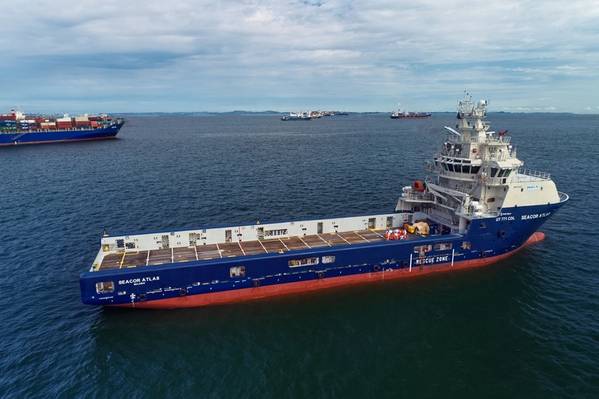
SEACOR Marine announced it will convert four of its platform supply vessels (PSV) to battery hybrid power in a move to enhance efficiency and slash emissions.
The Houston-headquartered marine transportation firm said on Thursday it has ordered containerized energy storage systems (ESS) from Norway's Kongsberg Maritime for install aboard SEACOR Ohio, SEACOR Alps, SEACOR Andes and SEACOR Atlas.
The four 278.4-foot-long PSVs are all of Kongsberg Maritime's UT771 CDL design and were built in China from 2018 to 2020. Each will be equipped for battery hybrid operation with the installation of a containerized Deckhouse ESS and associated switchboards and thruster control systems. The upgrade will also include a new Kongsberg Maritime K-Pos dynamic positioning (DP) system installed to replace the current DP system on all four vessels.
Retrofit work is expected to commence in December 2024 and wrap up by the second quarter of 2025. Once the installs are completed, more than 50% of SEACOR Marine’s PSV fleet will be hybrid powered.
John Gellert, SEACOR Marine’s Chief Executive Officer, said, “Our decision to expand our hybrid fleet aligns with SEACOR Marine’s core values of innovation and environmental stewardship and builds upon our record of leadership in adopting green technologies in the maritime sector. SEACOR Marine was one of the first offshore operators to install battery hybrid systems, and this announcement marks a significant step in our ongoing efforts to enhance operational efficiency and reduce the environmental impact of our fleet.
“These energy storage systems are an investment in the sustainable future of our fleet and our ability to meet the offshore transportation requirements of our clients worldwide. We are excited to offer our clients additional hybrid PSVs that operate efficiently through reduced fuel consumption and related operating costs, while also reducing greenhouse gas emissions.”
James Poulton, Kongsberg Maritime, Senior Vice President, Aftermarket Sales, said, “We see that by installing battery power, fuel consumption in DP operation mode on these vessels can be reduced by as much as 20%. In addition to batteries, the conversion will also feature a shore connection, enabling connection to power grids when in port, which greatly reduces the amount of engine running hours and emissions from diesel fuels. The key benefit of having battery power instantly available is to maintain the redundancy of the vessels’ power system, with less engines running. This is particularly useful when operating in DP mode, but also has its value in other operational modes.”
Beginning in February 2024 in Ulsteinvik, Norway, Kongsberg Maritime will also upgrade the SEACOR Yangtze—another UT771 CDL PSV built in China in 2018—with the Deckhouse ESS.